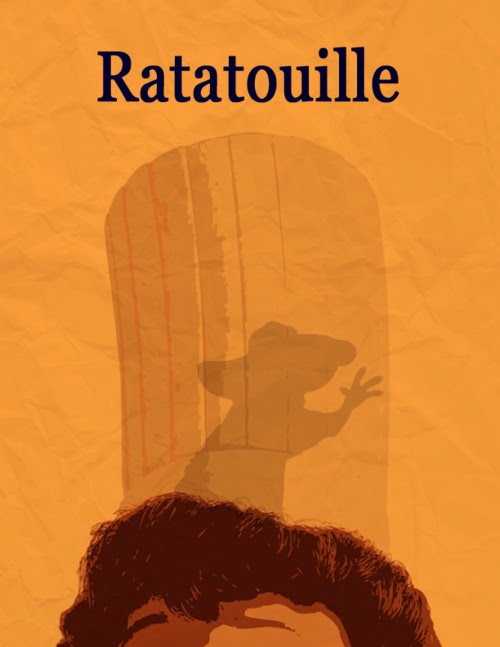 |
| Minimal Movie Posters |
Pixar excels in a couple of areas which make their films accessible and enjoyable to audiences of any maturity level. There's a kinetic flow through and between every scene which keeps the movie moving both visually and narratively. The imitation of actual camera movement is uncanny. The whole film is animated as if there were a camera shooting the action: there's depth of field, focus pulling, dolly tracks, and shot-reverse-shot, all of which capitalizes on audience's unconscious processing of this type of information. There are even distinct cinematographic differences between the perspectives of the humans and the rats (extreme low angles, close vs. wide framing, etc.) which shift away when Remy joins the humans and come back when he returns to his family. This aptitude of the Pixar animators makes their films eminently enjoyable in their immediacy.
The studio is also one which is continually challenging itself. Whereas Wall-E attempted to create characters which were sympathetic and relatable despite lacking the simplest of emotional markers (a mouth), Ratatouille takes on the constraint of having two characters who become best friends despite not speaking the same language. Remy can talk to his fellow rats and Linguini can talk to other humans, but the two never communicate verbally with each other. This leads to some lovingly rendered interactions and really plays to my love for slapstick (especially Remy controlling Linguini's body).
More than all this, however, is the studio's ability to create stories with polymorphous symbolism. Ratatouille, like the best of Pixar's releases, is meaningful on multiple levels. There are thematic strands intricately woven through the story ("anyone can cook," "cooks make, thieves take," "only the fearless can be great," "if you focus on what you left behind you will never see what lies ahead," etc.), all of which can be interpreted in a variety of ways. The movie can be read as an allegory for racism, classism, growing up, leaving home, sticking to your ideals, and much more because it captures something of the spirit of humanity. Even the film's title is polymorphous: we're told ratatouille is a peasant dish, emphasizing the theme of class conflict, but the way the duo transforms this dish again returns to the idea that "anyone can cook," or indeed that anything can be cooked, which feeds back in to the rest of the film's symbolic structure.
Ratatouille is a truly wonderful film and I can't wait to watch it again.
Added to lists:
Pixar Ranked | The Rewatch List

Comments
Post a Comment